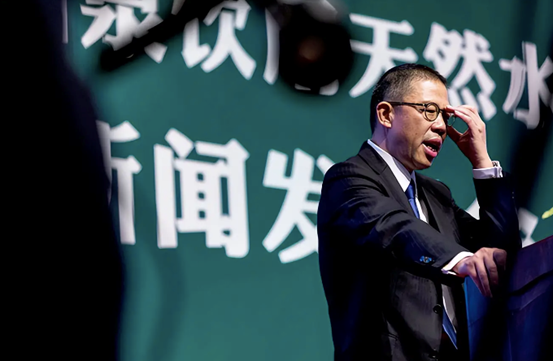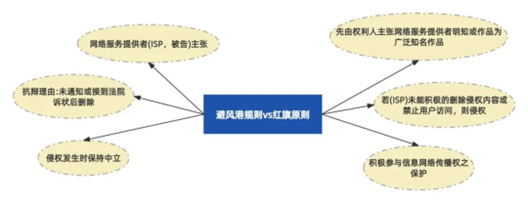Algorithms become rumor mongers' "henchmen", and Zhang Yiming and others cannot escape responsibility
![]() 11/26 2024
11/26 2024
![]() 561
561

Introduction: Zhang Yiming and others cannot escape responsibility behind the "malicious use of algorithms".
Author | New Consumer Finance Research Institute
The internet is an information amplifier. With the advent of the era of information explosion, the content distribution model based on big data and intelligent algorithms on internet platforms has also allowed incidents caused by the "information cocoon" and "cyberbullying" to unfold in turn.
Zhong Shanshan, the founder of Nongfu Spring, called out Zhang Yiming, the actual controller of Douyin and Toutiao, demanding an apology for the cyberbullying he suffered earlier in the year and the "rumors" about Nongfu Spring, sparking heated discussion across the internet.
"Algorithms should be clearly and unequivocally made public." Zhong Shanshan said that some platforms use their power indiscriminately, report out of context, and the algorithm mechanism must be changed. Internet platform enterprises must bear legal responsibility for verifying and confirming information.
Platforms should pay for "cyberbullying" and "rumors"
In recent years, the innovation and development of algorithms have become the driving force behind the advancement of internet technology, but they have also fueled the use of algorithms for unethical, illegal, or unintended behavior.
When algorithms are used to maximize profits or satisfy improper purposes, they may lead to malicious actions. There are many manifestations of "malicious use of algorithms," such as big data price discrimination, algorithmic bias, manipulation of public opinion and information dissemination, proliferation of false information, and traffic fraud. The algorithm itself is a neutral technology, but how it is applied depends on the user's intentions and values.
In a previous interview, Zhong Shanshan said, "The existence of rumors and false reports can cause greater harm to society. This is the law of the jungle implemented by modern technology on the internet, where the strong bully the weak. I respectfully request that Toutiao and Douyin do not evade responsibility under the so-called safe harbor principle. The spreaders and creators of rumors are equally guilty. I request them to immediately delete defamatory statements and images against me, stop harming a Chinese citizen, stop! Stop!"

Previously circulated screenshot of a Nongfu Spring rumor 1
The so-called "safe harbor principle" refers to Article 1195 of the Civil Code, which states that when network users use network services to commit infringement, the right holder has the right to notify the network service provider to take necessary measures such as deletion, blocking, and disconnecting links. The notification should include preliminary evidence of infringement and the true identity information of the right holder.

Source: Shanghai Fengxian Court
However, when cyberbullying and rumor-spreading incidents occur, these powerful internet platforms at most only provide the registration information of the infringer and delete inappropriate content, which is a reference to the safe harbor principle but is not sufficient to convince the public. Moreover, this principle is being abused.
For example, some industry insiders compare platforms to restaurants or supermarkets. When consumers go to a restaurant or supermarket and consume food that contains flies or purchase inferior products, it is clear that the restaurant, supermarket, and even the factories that produce the related products must bear corresponding responsibility.
Platforms like Douyin and Toutiao treat "traffic" as a commercial product, similar to the above logic. When problems arise, they should bear corresponding responsibility rather than using the so-called "safe harbor principle" as a shield. This may be an important reason why Zhong Shanshan's view that "the spreaders and creators of rumors are equally guilty" has received unanimous support from netizens.
In fact, it is untenable for platforms that provide inappropriate information to refuse to take responsibility on the grounds of being unaware or unable to verify the authenticity of the information.
Just as Wang Xin, the founder of Qvod, was sentenced for Qvod being accused of being used to spread pornographic videos in the early years. Although Wang Xin insisted that he only invented the Qvod video tool and provided the corresponding technology, in reality, Wang Xin was not only aware that the video software was being used to spread pornographic videos but also profited from it. Therefore, according to relevant laws and regulations, his criminal facts are undeniable.
Referring to these cases, Douyin and Toutiao indeed have unshirkable supervision and handling responsibilities regarding the dissemination of obvious false information and rumors. Any form of "turning a blind eye" by internet platforms to the dissemination of such content, as well as "turning a deaf ear" to the rumor debunking and clarifications of the parties involved, is a form of evasion of responsibility in a certain sense.
Algorithms become rumor mongers' "henchmen," whose fault is it?
The world is bustling, and everyone is driven by profit. The existence of self-media platforms such as Douyin and Toutiao may carry some ideals and sentiments of their founders, but ultimately, they are technological products driven by profit.
By "selling" users' attention, platforms can obtain huge "sponsorships" from various businesses, including but not limited to receiving advertising fees from advertisers for advertising placement, earning service fees through live streaming and short video e-commerce, and even directly earning a lot of money by "selling" traffic at a clear price.
Just as Toutiao's slogan goes, "What you care about is the headline." It is undeniable that Toutiao's pioneering intelligent distribution model of "content finding people" in the early years was indeed a "fresh breeze" in the internet era and even a milestone event that distinguished it from the era of internet portals. Even authoritative media such as China Internet Network Information Center have given high praise to this brand-new content dissemination model.
However, the world is dialectical, and so are big data algorithms. The popular news you see may be completely unknown to your friends. And the popular information shared by friends may leave you utterly confused. As a result, people living in the same circle may experience a huge information gap due to their different interests and hobbies. Sociopsychologist Eli Pariser likens this phenomenon to a "filter bubble," while the media refers to it as an "information cocoon."
Eli Pariser believes that personalized algorithms only present information that aligns with people's ideologies, narrowing their horizons and reducing opportunities to access diverse information.
More critically, big data algorithms, like money, have no values. When used for benevolent information, they can rapidly spread positive energy. However, if used for malicious rumors or cyberbullying attacks, this lack of values in algorithms can infinitely amplify their harm.
The aforementioned experience of Nongfu Spring and Zhong Shanshan is a typical example.
When many self-media practitioners and netizens discover that slandering Zhong Shanshan and spreading rumors about Nongfu Spring can generate huge traffic and even exchange it for traffic rewards and subsidies, an extravagant feast of traffic, then more and more people will inevitably join this traffic feast, regardless of the facts being distorted and the interests of the parties involved being infringed upon.

Previously circulated screenshot of a Nongfu Spring rumor 2
At this time, platforms like Douyin and Toutiao, which are traffic and content distribution platforms, only need to hide "in the background." Once something goes wrong, it is the information creator who is punished, while internet platforms can use "exemption," "unawareness," and other excuses to push off all related responsibilities. Obviously, this is not reasonable for either the parties affected by rumors and cyberbullying or self-media practitioners involved in the creation of false information.
This may be the fundamental reason why Zhong Shanshan publicly appealed that "the spreaders and creators of rumors are equally guilty."
In fact, cyberbullying is as ferocious as a flood. As a well-known entrepreneur and public figure, Zhong Shanshan cannot even receive an apology and explanation. For ordinary netizens, seeking justice after being harmed is even more difficult.

Screenshot of a rumor about a Nongfu Spring product circulated online
I believe many people have noticed that not a few victims have chosen to take their own lives due to insufficient psychological endurance when subjected to cyberbullying and rumors, and some have had to choose to withdraw from the internet due to cyberbullying.
This includes a mother in Wuhan who jumped off a building after being cyberbullied following the death of her child in a car accident and failing to seek justice, as well as well-known artist Huang Xiaoming and Ye Ke, who were freely in love but were subjected to extensive discussion and various attacks by netizens. Ultimately, Ye Ke decided to withdraw from the internet due to physical discomfort and family reasons.
Online rumors continue unabated because the "extravagant traffic" is highly profitable. This type of content is strongly recommended by platform algorithms and can be exchanged for "real money" by the disseminators.
For example, the rise of Toutiao and Douyin is inseparable from the platform's content creation subsidies, and these subsidies also "follow" hot topics and traffic. In the early years, when short videos were gaining popularity, ByteDance invested heavily in Douyin content creation. Subsequently, under the wave of medium video popularity, Toutiao began to heavily subsidize medium video content creators and launched the "Medium Video Partner Program.""
According to incomplete statistics, the subsidy amounts for ByteDance's three major platforms, Douyin, Xigua Video, and Toutiao, are in the billions. Additionally, in the currently popular short drama sector, Douyin has also invested heavily. At the beginning of 2024, Douyin launched a premium micro-short drama support program, clarifying that creators can receive a maximum of 5 million yuan in cash and 100 million traffic support.
Under the "temptation" of huge cash subsidies, content creators are willing to take the risk of infringement and rumor-spreading to disseminate false information that they themselves do not even believe. Many creators have also paid a huge price, including "imprisonment."
For example, in January 2024, a fake headline news about an "explosion in Xi'an" experienced abnormal traffic and came to the attention of the police. According to the police investigation, the account that published the news belonged to an MCN agency in Nanchang, Jiangxi Province, which published an average of 7,000 related false messages daily. The purpose of spreading rumors was to obtain traffic rewards from the platform.
In addition, at the beginning of November this year, three rumor-mongers were punished by the police for fabricating the "Chengdu serial rape and murder case." This shows that when rumor-mongers publish false information, if the platform does not screen it and instead increases its traffic, it is no different from aiding and abetting, making the algorithm a henchman and accomplice of "rumors" and "cyberbullying."
Guiding algorithms to be "upward and benevolent" is the aspiration of the public
Driven by Zhong Shanshan, the topic of whether Douyin and Toutiao truly disclose their algorithms has also sparked heated discussion. In fact, according to the "Provisions on the Administration of Algorithm Recommendation for Internet Information Services" issued in the early years, the algorithms of Douyin and Toutiao were also filed.
However, in the practical application of algorithms, the abuse of the "safe harbor principle" has led to some obviously false information being further amplified by big data algorithms, thereby causing greater social harm.
Therefore, industry insiders believe that in this era of information explosion, blindly following the "safe harbor principle" may do more harm than good. When appropriate, the red flag principle should be activated.
The so-called red flag principle is an exception to the "safe harbor" principle, referring to the situation where if the fact of infringement of the right to disseminate information on the internet is obvious, like a red flag waving, the network service provider cannot pretend not to see it or use the excuse of not knowing about the infringement to evade responsibility. If necessary measures such as deletion, blocking, and disconnection are not taken under such circumstances, even though the right holder has not sent a notification, the network service provider should still be deemed to know about the third-party infringement and bear responsibility for it.
Otherwise, internet platforms like Douyin and Toutiao, which control traffic chips, will become tools that interfere with public opinion or even sway it. They can be used by netizens who spread positive energy or by unscrupulous individuals with ulterior motives or greed.
On November 24, the official Weibo account of the Cyberspace Administration of China, "Cyberspace China," released the "Notice on Launching a Special Action to Address Typical Issues Related to Algorithms on Internet Platforms." This clean-up action specifically addresses typical issues related to algorithms on internet platforms. This also means that major internet platforms may usher in a severe "crackdown period" on false information. Super apps like Douyin and Toutiao, which have long been accused of spreading rumors, will bear the brunt.
Industry insiders generally believe that it is necessary to actively address key issues of public concern, such as homogeneous push notifications, illegal manipulation of rankings, and big data "price discrimination," and to enhance regulatory means such as guiding algorithms to provide "upward and benevolent services."
In the view of Bo Wenxi, vice chairman of the China Enterprise Capital Alliance, there is indeed an inevitability to improve the algorithm mechanism represented by Toutiao and Douyin. The state's promotion of in-depth rectification of issues such as the "information cocoon" and induced addiction directly points to the problems existing in the current algorithm recommendation mechanism.
This shows that such issues are becoming increasingly serious and have received high attention from relevant national departments, meeting the expectations of the general public. It is not only an inevitability of social progress but also a necessary move for technology companies like ByteDance to seek sustainable development, fulfill their social responsibilities, and even cater to the trend of "technology for good."
END





